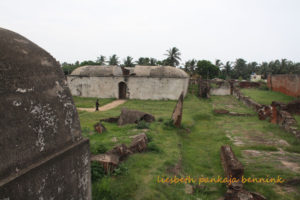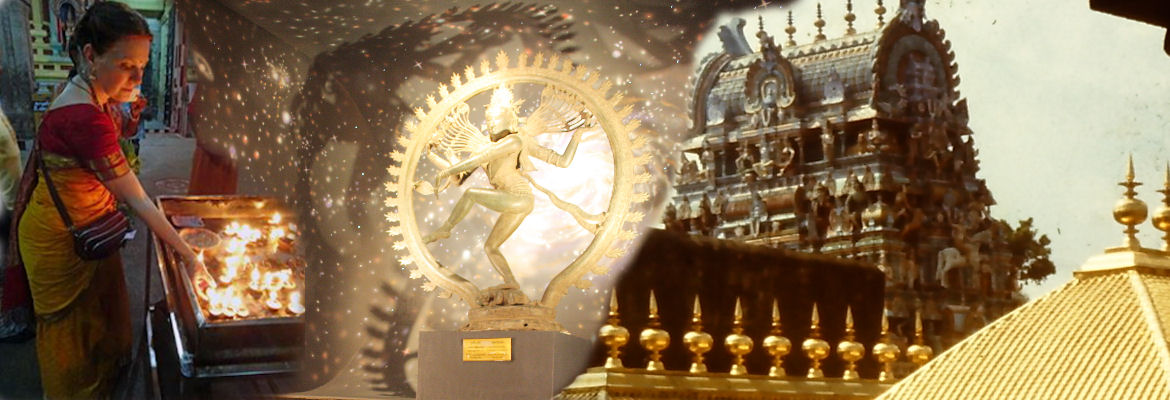
Jacob Haafner remembers his stay of one and a half years in Sadras as the best time of his life. He had a job that satisfied him and paid well. But he best remembers the relaxed life style, where natives and foreigners lived peacefully together and mixed and partied casually. And it is here that he started his studies of Indian culture, began learning Sanskrit, learned to speak Tamil fluently. Sadras or Sadurangapattinam is a few kilometer south of Mahabalipuram, right next to where we now find the Kalpakkam Nuclear Power Station. It was around the time of the Second Anglo-Mysore War (1780-1784). Haafner’s sympathies were square on the Indian side. As can be seen in his recounting of one incident in which he, according to his own account, played the role of hero for Hyder Ali’s troupes.
Kinchant, the English spy
Some time after the invasion of Hyder Alichan in Carnatica, an Englishman, with the name of Kinchant, came to us from Madras, pretending to have been forced to flee from there, because of an unfortunate duel, (in which he had mortally wounded his adversary). He requested the protection of the Dutch flag from the Chief, as not knowing how his case would finish. His request was granted; after which he rented a house at Sadras, and established himself with us.
This Englishman was a clever and cunning fellow, spoke several languages; like French, Italian, Latin and Hindi; and also Dutch; but he held himself as if he was completely ignorant of the latter language, and didn’t understood a single word of it. But he could not deceive me long. I discovered altogether that he not only did he speak our language, but that his pretended duel at Madras was an invented lie, and so warned all and especially Chief De Neijs, and the Second Simons, to beware of this traitor; at least it was certain that he was a secret agent of the Madras Government, which, under the pretension of having to flee, had settled down for some nefarious purpose in Sadras.
In a word, I saw him for a spy, and treated him with coldness and even with contempt; how much he interfered and did his best to gain my friendship, and to involve me in his interests. However, he succeeded better with Mr. De Neijs, who was not only very pleased with him, and showered all his trust on him, and even got involved with him, at the detriment of the Nabab Hyder Alichan, to the extend that it came almost to it that all Sadras with all the inhabitants thereof, would have been destroyed by fire and sword. That this didn’t happen is all truly due to me. I will recount this case at length in another place.
Mackay’s betrayal of Sadras
Some weeks before we found ourselves in this terrible danger, the Carangoelypaleum’s Havaldar* (or commander) Rosan Alichan came to Sadras accompanied by a Jammedaar (Jamadar, a head of cavalrymen) with 20 horsemen, and brought a Parvannah, or order from the Nabab Hyder Ali, to Mr. De Neijs; in which the same was ordered to send a skilled Vakil** to the army, to discuss about affairs and business with the Nabab.
The Havaldar and his people would leave again the next day with the Vakil; they had for that purpose set up camp in a guesthouse called Mutu Chetty Chauderie, which stood just outside the village.
That night there was a big party at the Chief De Neijs’s, all the staff and also this Englishman Kinchant were invited.
His servant brought him, while we sat at the table, a letter which he broke open, and read to himself; and about the content of which he seemed very pleased.
“Good news? Mr. Kinchant,” asked the Chief, “or a letter from your beloved?” “Well guessed, well guessed,” he called out laughing, “an amiable girl in Madras wishes to see me again with her.” A little joking and laughter happened and afterwards other topics were discussed.
Not a love letter, but a conspiracy
After dinner they opened the ball again; several of the company, which did not desire to dance, went into the garden to get some air, among others also Kinchant; I stayed in the room. Some time after I also wanted to go into the garden; when I entered it, I saw something white lying behind a tree, it was the letter Kinchant had received from Madras, which he probably had lost when taking out his handkerchief.

No one had seen me picking up this letter, thus I could read it without fear, and satisfy my curiosity, of which I was not a master. Here I found nothing punishable; on the contrary, I considered it my duty, to check out this Englishman, whom I always distrusted, to consider him with some surety. From this letter I might be able to find out the real purpose why he had settled down himself in Sadras. Not long after the company separated, and each went to his house.
Scarcely I was at liberty, or I opened the letter. He was not from Madras, but from Chenglepette; the Commander of the Fort, Mackay, of whom I have had the opportunity to speak, more than I would care for, gave him some few lines information that he, following his letter, had send out 40 men immediately after sunset, and had ordered the commanding officer to go to Sadras, in the greatest silence, with detours, and along impassable paths; and to raid the unsuspecting and sleeping Havaldar and his horsemen about 2 o’clock in the morning, when everyone was sound asleep, and to sable down all who offered resistance.
Haafner saves the Mysorians
One can think, how I was shocked; I looked at my watch, it was past one. Without thinking one moment, I flew out of the door as fast as I could run. Completely out the breath I came to Chauderie, where all were asleep; no one stood guard, it was definitely loose and imprudent; but these people expected to be in safety; they were in Sadras’ territory; nobody, without infringing our neutrality and our flag, could assail them here.
“Odipo! Odipo!” I cried with half-voice, while I have for some shaking up, “Odipo! Ingreskaren varugren! flee! flee! the English are coming.” Instantly, everyone was on their feet, all flew to their horses, which were standing, bridled and saddled, tied to the trees; in less than two minutes they were on. “Step closer, I pray thee, thou good Angel! who are you?” cried the Havaldar. Now he recognized me, because I had visited him that afternoon in Chauderie, and had smoked hookah with him. “Ah! It is thee!” He had scarcely uttered these words, or we saw the rifles of the English flicker in the distance.
“Sordé!” he exclaimed, and at once the whole gang rushed away at full gallop; when the English arrived, the birds were flown, and I made sure that they did not become aware me.
* A havildar or havaldar (Hindi: हविलदार (Devanagari) حوِلدار (Perso-Arabic)) was the military commander of a fort during the times of the Mughal Empire and later Maratha Empire.
** Vakil, a representative, especially of a political figure; an official or ambassador.

S.Ravi
Excellent memoir,kudos to Ms.Liesbeth’s efforts for the noble task she undertook in publishing this
liesbethpankaja
Thank you Subbiah Ravi, good to know people appreciate it.
Sam
Jamadar is wrongly translated as Zamindar. Jamadar is a head of cavalrymen and Zamindar is a land lord
liesbethpankaja
Thank you, I was just guessing. I will adjust it in the text.
Charles
Hai I am living person sadras very interesting msg this